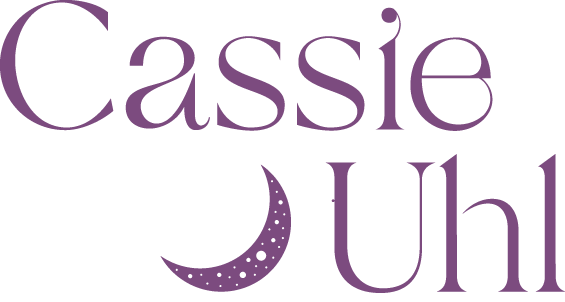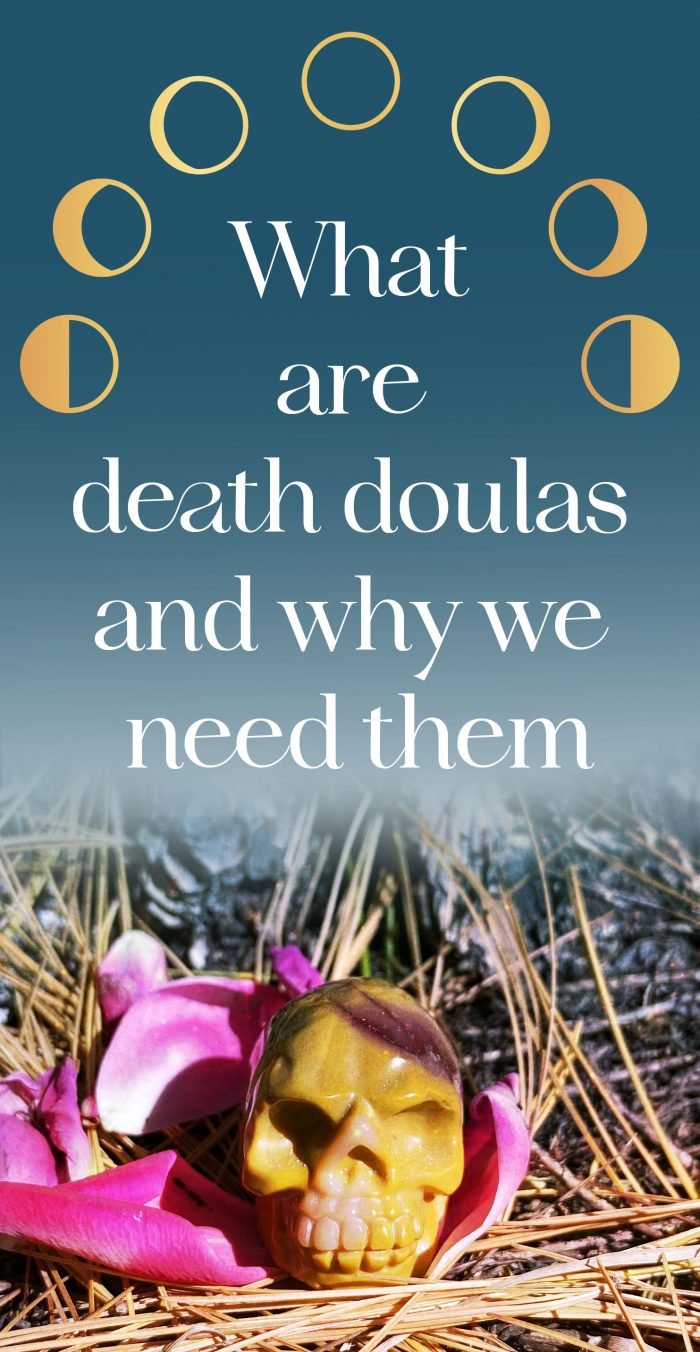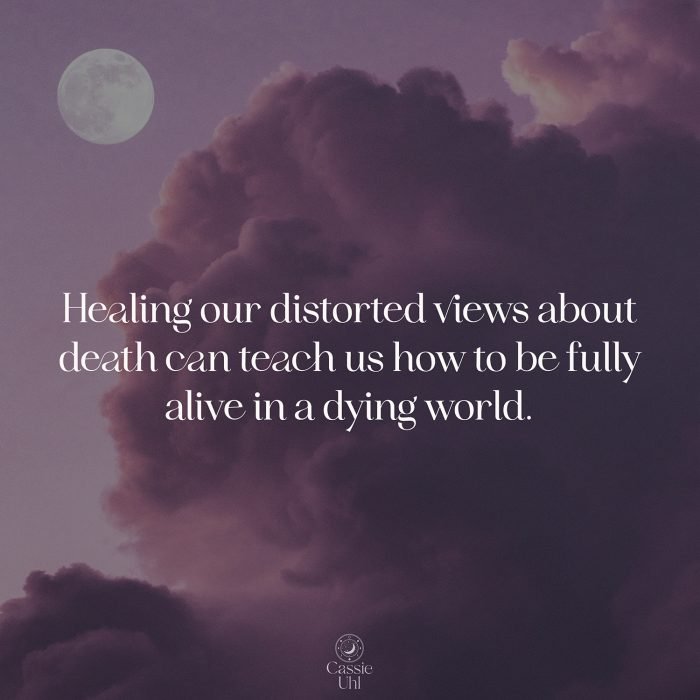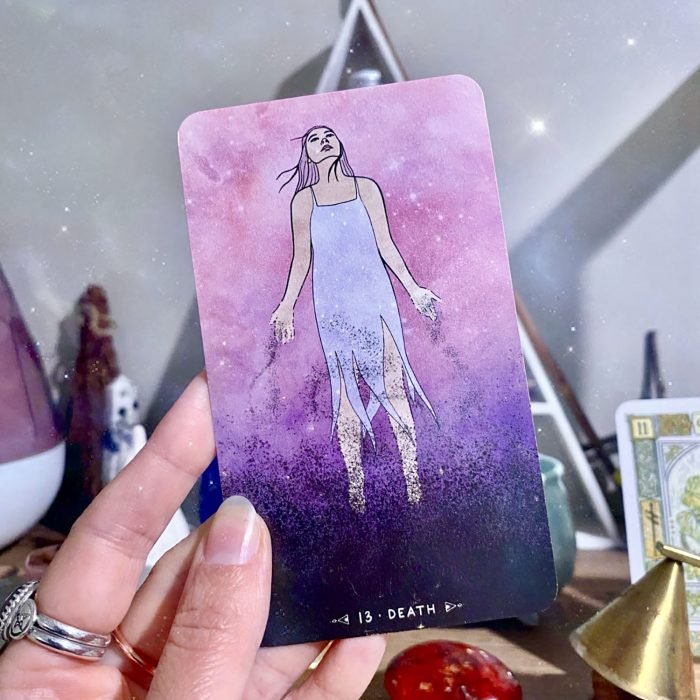What are Death Doulas and Why we Need Them
It's time to call in our demons around death and dying. They need healing and nourishment. As we continue to walk through a world steeped in an ebb and flow of grief and death, we have an opportunity to address our relationship with death and dying. Not only do we need to address these wounds to better equip us to care for our dying, but I believe there's also a well of healing to be found within nourishing our wounds around death. Addressing our relationship to death and dying is one way to do this. Addressing how we care for the dying is another way to do this.
In this share, I'll offer some personal thoughts on why so many of us have a difficult relationship with death, especially in the West, opportunities and ways to heal our connection with death and the benefits of doing so. You'll also learn what a death doula or end-of-life doula is and their role in the dying process.
Listen to this post on my podcast here.
If you think this doesn't seem like a very spiritual topic, that's precisely why I'm talking about it. We're all going to die, even you, and if our spiritual practices only encompass life, then we're missing a huge portion of wisdom by avoiding talking and thinking about death. If you have anxiety about your mortality, and the mere mention of discussing death stirs internal fear and anxiety, you are not alone. I encourage you to stick around. I, too, used to have intense fear and anxiety about dying.
I spent a large part of my adolescence and young adulthood holding onto an intense fear and anxiety around dying. It caused me sleepless nights and even altered my plans from time to time. The worst part was that I didn't feel like there was anyone I could talk to about these fears. I knew they were deeply irrational and therefore spent most of my time trying to block these feelings, making them even more debilitating.
It wasn't until I was faced with death through the loss of my beloved grandmother and father within two months of each other that my thoughts and feelings about death slowly began to shift and change. I witnessed firsthand how dysfunctional our relationship with death is as I watched much of my family spiral into chaos with little support. Within the depths of my grief, something in me was cracked open. The tears from my sadness slowly eroded away my long-held fears about dying. The deep grief I experienced from these losses opened a pathway for healing my relationship with death and dying, and it also showed me the need for better death care.
This theme is reflected in the wise quote by Rumi, "The wound is the place where the light enters you." The wounds we face at different points in life can have the potential to grow and heal parts of ourselves when we have the time and space to do so. Of course, it also needs to be noted that having the time and space to heal our wounds when they arise is a privilege in and of itself and one that not all have access to.
The healing I experienced around death was not immediate. It slowly unraveled as I rode the waves of grief over several years, leaned into therapy, and explored death through my spiritual practice. My healing around death is still ongoing today. Like all healing, there's no finish line but a continuous spiral of growth and learning. Though I no longer experience the fear and anxiety of my inevitable death, I continue to find ways to challenge and heal my relationship with death and dying. Which, today looks like talking about death more and uprooting and untangling patriarchy and white and human supremacy from how I see and experience death. I've learned that the wise woman within me knows that death is a natural and even beautiful part of the cycle, not a failure as patriarchy would have us see it, which brings me to some thoughts on how we got here.
How did we get here, and why we need death doulas so badly right now?
In my personal experience with death and dying, combined with my spiritual practice and end-of-life doula training, I've realized that many of us carry a wound around death, and why wouldn't we? We rarely talk about it, our society, by and large, aims to remove death from sight, and many view it as a failure rather than a natural part of life. For example, phrases like "so and so lost their battle to cancer" imply that certain kinds of deaths are a failure instead of normal and natural parts of being human.
It goes much deeper than our simple avoidance of the topic. Wounds around death are yet another side effect of patriarchy, white supremacy, human supremacy, colonization, capitalism, and the suppression of earth-based, often Goddess-based, spiritual practices. Patriarchy and all of the supremacies live in a linear framework that always aims for more growth, creating a path that only leads up to more, more, more. Linearity leaves no room for death, individually or as a society. When our systems are set up to sidestep death and dying, it can feel challenging to embrace or even discuss death and dying because the systems in which we live do not allow space for it.
Our linear-focused society has been detrimental to ourselves, the planet, and all of its inhabitants. It reminds me of something I hear echoed by many of my anti-racism and decolonial teachers like Thérèse Cator and Dr. Rocio Rosalez Meza, which is the idea that due to white supremacy, white folks, especially, are cut off from our humanity. This couldn't be more clear than our relationship with death. Death is a natural part of being alive. Yet, our focus on supremacy and linearity strips us of our connection to death and its inherent wisdom. Though I don't think wounds around death are exclusive to white folks, I do think it's more prevalent. Our severed relationship with death and dying is yet another way we’ve been cut off from our humanity.
These ideas are a very condensed explanation of a much larger issue in which I am not an expert. In my study of anti-oppression work, death, and my spiritual practice, I've come to these conclusions. I encourage you to explore your ideas and learn from teachers who speak on the topic, especially those in the BIPOC community doing this kind of work.
Healing death wounds
So, where do we go from here? Here's a quote from one of my favorite books titled Mysteries of the Dark Moon by Demetra George, which is where I found the inspiration for the opening of this share, and I find she illustrates perfectly our need to heal our wounds around death.
"We must call our demons in from the backyard where they've been starved and banished into the leaking doghouse. We must welcome them in the warmth of our kitchens and feed them the foods that will heal their wounds of rejection. As we cleanse our inner images of the Dark Goddess through loving and accepting her, we will notice a corresponding decrease in the fear, anger, rejections, failure, disappointment, deceptions and hatred that we experience as part of our outer reality. In this way we reach the original true essence of the dark feminine that exists within us, an essence that is unclouded by layers of distortion."
Mysteries of the Dark Moon by Demetra George
I think this is a beautiful and powerful starting point. We must begin to call in death and invite death into our hearts and homes to heal our wounds around it. In doing so, we can become more whole. Furthermore, I find that addressing our relationship with death and dying in relation to where we are now as a collective is imperative and can give us the tools needed to remain grounded and useful in uncertain times. None of us are immune to the effects of climate collapse, and even if you've yet to be affected by it, it will affect all of us at some point, and grief and death will no doubt be a natural outcome.
Like our more than human plant and animal kin, death is an integral part of our cycle. It's easy to see the value of death in the natural cycles of plants and animals. Death is a needed part of the cycle that offers rest, decomposition, nourishment, and, eventually, rebirth. Though we've tried, we are not separate from this web, death will come for each of us, and it can have meaning too. Healing our relationship with death can have as much value for us today as the day we take our last breath. The sooner we each face our demons around death and dying, the more fully we can live in a world inundated with death.
This isn't to say that all deaths are fair and just. Absolutely not. The devastation we've already seen due to climate change disproportionately affects people of color and historically marginalized communities who have contributed the least to climate change. We should continue to fight against it. Changing our relationship with death can give us the tools to navigate these times and enable us to continue striving toward a more just and livable world rather than resulting to fight, flight, or freeze.
When we see ourselves as part of the web and cycles inherent in the earth, we can learn from the wisdom death has to offer. Healing our wounds around death can give us the resources and words we need so badly right now, resources like understanding living cyclically, being able to take ownership over our role in the current death cult of white supremacy, human supremacy, and patriarchy, the ability to be fully present with our human kin in their death phase, and understanding the need for contraction and death in our day to day lives and work. Healing our wounds around death gives us the language we need when we know we must step back from work, relationships, and the grind of living in a capitalist society.
We need to learn how to live in a world where excess death seems impossible to avoid. We must learn to be in a world that asks us to walk alongside death. And that is a big ask.
Death card from Journey Tarot by Cassie Uhl
Let's talk solutions and explore how death doulas can be one part of helping us heal our wounds around death and dying.
Death doulas, death midwives, and death walkers
An obvious place to begin healing our relationship with death is to offer better care to those dying. Anytime I bring up the term "death doula," people are immediately curious. This curiosity shows me how eager many are to have a better relationship with death. People are starting to see the benefits of discussing death more, planning for it, and offering more emotional and spiritual support for those at the end of life. Physical care from hospice and spiritual care offered by organized religion is no longer enough for most of us. In 2021 only 29% of people in the US identified as religious. We need more when it comes to facing our own deaths and the deaths of our loved ones.
I had the unique back-to-back experience of being with my grandmother during her death due to terminal cancer and my father's sudden and unexpected death due to a heart attack. I experienced firsthand how each kind of death, known and sudden, affected our family and me. While walking through these experiences, I learned a lot of things, but what stood out to me the most was the extreme lack of emotional and spiritual support for the dying and their loved ones. I also learned that death tends to bring out the worst in caregivers (likely due to lack of support) and that, due to my spiritual practices, I was able to remain relatively grounded in these environments.
After these experiences and other family deaths in the subsequent years, I knew I was supposed to be working with those on their death journey and talking about it more. When I heard the term "death doula" in 2019, I knew it would be part of my path, and I completed my end-of-life doula training with INELDA in 2021 and am currently in the process of completing my certification. Let's dive into what a death doula is and how they can offer support.
What is a death doula?
Before I share more about what a death doula is and does, there are three important things I'd like you to keep in mind.
First, though the phrase "death doula" may be relatively new, it's important to mention that the role a death doula offers is not new at all. In many indigenous communities, there have been and still are many acting as "death doulas" far earlier than the term was coined.
Second, there's currently no standardization or regulation over the death doula field, so the scope and quality of training vary. I urge anyone curious about hiring a death doula to research where they were trained. This isn't to say that formal training and certification are a must, as mentioned above, but be sure to do your research before hiring someone.
Hospice does an incredible job of ensuring that those at the end of life are physically comfortable. Whether or not someone wants medication to aid their comfort as they die is a personal choice and not something in which a death doula should have any say. The death doula's role is to support the dying person's wishes, whatever they are, which includes any other support team that is part of that person's team.
The simple explanation of a death doula is someone who offers non-medical, emotional, and spiritual support to the dying person and loved ones. But this usually leaves people with even more questions, so let's dig deeper.
In my training, the role of the death doula was broken up into three tiers with several subcategories, which I'll share a bit about here.
1. Summing up and planning
I see this as one of the most important areas of the death doula model. It gives those dying time to explore meaning in their life, address unfinished business, create legacy projects, and plan for their death. These are many of the areas that hospice teams simply do not have time for and areas that may be too difficult for families and loved ones to address on their own. Summing up and planning requires time and the ability to listen deeply and non-judgmentally.
The death doula offers deep active listening to their clients, giving them the time and space to think and share about some of the most important moments in their lives. Summing up in this way can uncover parts of their lives that they wish to address before they die, allowing time for addressing regrets, healing, or making amends. It's also a way to determine what legacy projects may benefit the client and their loved ones.
Legacy projects can range from scrapbooks and video recordings of special stories to collaborative art projects that preserve important parts of the dying person's life or personality that can live on for the family. A study conducted in 2008 by a group of palliative doctors showed that those who were dying and their caregivers who participated in legacy projects showed a decrease in stress and an increase in physical well-being. A tremendous amount of focus is given to the physical comfort of those dying. While comfort is certainly important, implementing a legacy project gives those dying and their families something else to focus on that can have a long-lasting and meaningful effect on all involved.
Finally, the death doula gives clients time and space to explore how they want their death to look and feel. They may discuss what sites, sounds, and scents they'd like present while they're dying. Who they want to be there or not for their death and if they'd like any special rituals to take place before and after their transition. Not only does this give those facing the end of life comfort that their death will look and feel how they want it to, but it gives them back a valuable sense of control. This kind of care and attention has become common practice with birth and the role of the birth doula. Why wouldn't we extend this same time and planning into our deaths?
2. Vigil Support
When death is imminent, it's time for the vigil or death labor. The vigil is the time when the dying person is on their final journey toward death, which can last one to several days. At this point, the death doula will help ensure that the dying person's wishes for their death are implemented. This doesn't necessarily mean that the death doula will be "in charge" or doing everything. It means they will help support the other caregivers in implementing the dying person's wishes.
Support could be through offering respite for the family, planning, creating schedules, facilitating rituals, or simply holding calm and grounded space for the dying person and their family. It's also quite possible that the family won't need the help of a doula to do this. Some families may feel able to implement things on their own. The amount of support each person receives will be unique.
A death doula can also help offer non-medical comfort care to the dying person by facilitating guided visualization meditations and, for those trained, energy healing, a service I include for those who want it. Finally, the death doula can also offer the family the important service of respite.
3. Early Grief Reprocessing
The final portion of care that the death doula extends is early grief reprocessing for any loved ones or caregivers who want it. Early grief reprocessing is also a wonderful option for those who've experienced the sudden death of someone they love. Similar to the first stage of summing up and planning, the primary role of the death doula is to offer non-judgmental, deep active listening to loved ones.
Early grief reprocessing allows time for family and caregivers to recount some of the most meaningful and difficult experiences they had during the death of their loved one. This time may even uncover a desire to create legacy projects or rituals of their own based on the experience of their loved one dying. For those who experienced the sudden death of a loved one, this can allow time to recount and explore the feelings associated with the death and open up pathways to bring meaning and ritual into the experience.
Grief reprocessing usually lasts 2-3 sessions and is not intended to replace a grief therapist but may be a stepping stone to traditional therapy for some. A primary benefit of the death doula offering this service is that, at this point, families will have been working with the same death doula for an extended time already. This report allows them to recount important moments during the death of their loved one with someone they already know and went through some of the same experiences with.
Death doulas outside of active dying
As I mentioned earlier, you will see a lot of variety in how death doulas serve their communities. This variety is for a couple of reasons. First is the lack of standardization and regulation in the field. Second, each death doula brings unique skills. Some end-of-life doulas may focus more on a specific area. For example, I offer energy healing and energetic assistance in transitioning for clients who want it. That is certainly not a requirement or something all death doulas will offer! Some death doulas only work with pets and pet owners, while others may only focus on the summing up and planning area. Each doula is unique.
There are also many roles that a death doula can fill outside of assisting those who are actively dying. This is a big reason why this work called to me. I see a huge need for more discussion and space holding around death for the living, so I've created a separate offering called the "Death Exploration Container." In this offering, I assist and hold space for folks who want to contemplate and plan for their inevitable death. Not in a legal way but in emotional and spiritual ways by providing proper nervous system tending while approaching topics around mortality.
This experience will look different for each person, which is why I include a free consultation call before you book. This service could explore any of the following themes: exploring the meaning in your life, embarking on guided meditations to reflect upon how it might feel to be faced with a terminal illness, identifying and addressing regrets, thinking about and planning for how you'd ideally like your death to look and feel if allowed to do so, frameworks for beginning legacy projects for yourself, and exploring what rituals you might like to be a part of your death.
You don't have to wait until you're dying to start planning for your death. Many of us won't have the luxury of knowing when and how we will die. Planning for death is not only one of the best gifts you can give to your loved ones, but it's also a huge gift you can give yourself. If you've sat down to think about your own death, you probably already know this, but for many, this feels like a huge and scary task! I used to think I would die if I planned my death. I know I'm not the only one who's thought this! Let me be the one to tell you that planning for your death will not make you die, at least not right away. I mean, we're all going to die eventually. But, thinking about and planning for your death can give you peace and begin building a foundation to call in and heal our wounds around death and dying.
This share has already become much longer than I anticipated, so I think I need to stop at this but know I have more to share! I look forward to talking more about finding and honoring all of the mini-deaths that happen within our lives and celebrating them as a right of passage. Let me leave you with some resources if you feel compelled to explore this topic more.
Of course, if you are interested in working with me in either of these ways, click here to learn more or to schedule a free consultation call. I went through the program with INELDA, the International End of Life Doula Association. I highly recommend it and thoroughly enjoyed it. It is also very affordable. The founder of INELDA, Henry Fersko-Weiss, also has a book that dives deeper into many of the topics shared here, Finding Peace at the End of Life. I've just started the book Death Nesting by Anne-Marie Keppel and am loving it. From a spiritual standpoint, I highly recommend the book Mysteries of the Dark Moon by Demetra George. Finally, here are some of my favorite death accounts to follow on Instagram @the.death.empath, @cait.deatheducation, @going_with_grace, and @deatwives. This is a short list, and there are sooooo many more great accounts.
If you received something from this share, please share it with someone who may enjoy it too.





